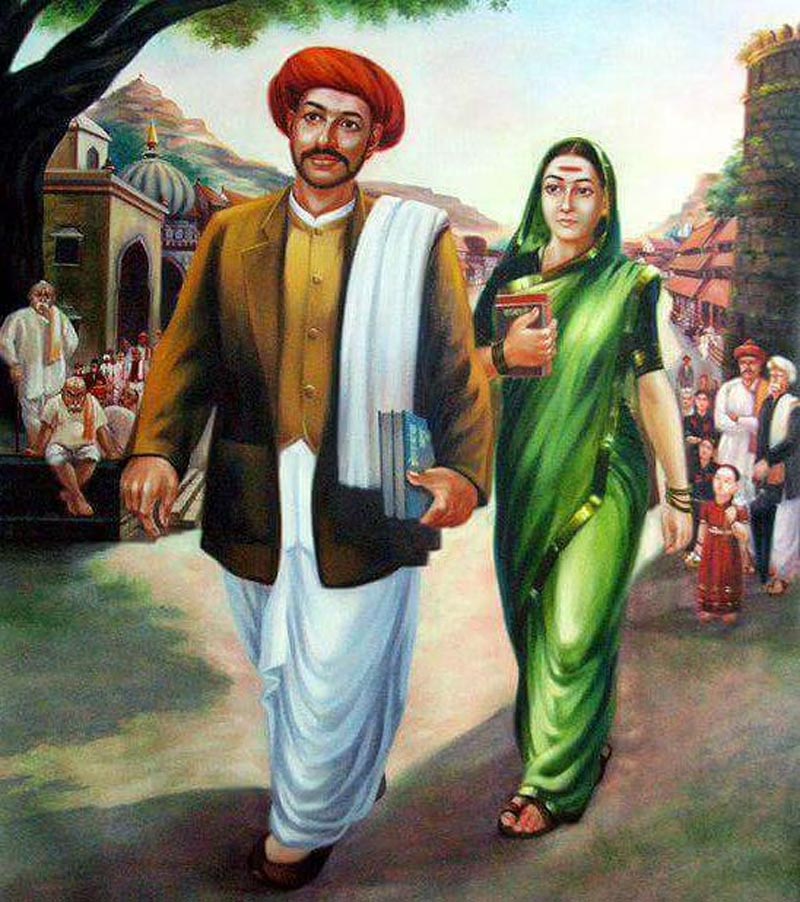How Jyotirao Phule and Savitribai Changed India Through Satyashodhak Samaj
In 19th-century India, a society shackled by caste oppression, patriarchy, and superstitions found two of its fiercest reformers in Jyotirao Phule and Savitribai Phule. Through their groundbreaking work and the establishment of the Satyashodhak Samaj (Society of Truth Seekers) in 1873, they ignited a revolution for equality, education, and justice. This movement was not just a challenge to societal norms—it was a blueprint for change that still resonates in modern India.
The Beginning of a Revolution
Born in 1827 in Pune, Jyotirao Phule grew up witnessing the deep injustices of the caste system. A pivotal moment in his life occurred during a Brahmin wedding procession, where a Dalit groom was insulted for daring to break societal barriers. This event sparked Jyotirao’s resolve to dedicate his life to dismantling caste discrimination.
Savitribai Phule, born in 1831, shared her husband’s vision and became India’s first female teacher, working tirelessly to educate girls and Dalits. Together, the Phules formed an indomitable team, laying the foundation for one of India’s earliest social reform movements.
Establishing the Satyashodhak Samaj(Society) in 1873
On September 24, 1873, Jyotirao Phule founded the Satyashodhak Samaj to create a society free from caste and gender discrimination. The organization aimed to empower marginalized communities—Dalits, Shudras, and women—through education, self-respect, and rational thought. The Samaj also promoted inter-caste marriages and denounced the dominance of Brahmins in religious rituals. Its slogan was clear: truth-seeking over blind faith.
Key Milestones of the Movement
1. Educational Reforms
In 1848, Jyotirao and Savitribai opened India’s first school for girls in Pune. They later established schools for Dalits and other marginalized groups, emphasizing that education was the key to liberation. Savitribai faced immense hostility, often being pelted with stones and cow dung, but her determination never wavered.
2. Ghulamgiri (1872)
In 1872, a year before founding the Satyashodhak Samaj, Jyotirao Phule published Ghulamgiri (Slavery), a scathing critique of the caste system and Brahminical dominance. The book compared the oppression of Dalits and Shudras to the enslavement of African Americans, drawing parallels between global systems of exploitation. It called for unity among the oppressed to overthrow these hierarchies.
3. Sarvajanik Satyadharma (1873)
The Sarvajanik Satyadharma, or “Universal Religion of Truth,” was a manifesto of the Satyashodhak Samaj. It proposed a rational, inclusive religion that rejected rituals and priestly control. This doctrine advocated for moral living, truth-seeking, and universal equality.
4. Advocacy for Women’s Rights
The Samaj condemned practices like child marriage, dowry, and the mistreatment of widows. Savitribai opened shelters for widows and pregnant rape survivors, offering them dignity and support.
5. Inter-Caste Marriages and Social Reform
The Satyashodhak Samaj organized and officiated inter-caste marriages without Brahmin priests, an act of defiance against the caste system.
Challenges Faced
The Phules and the Satyashodhak Samaj faced relentless opposition from orthodox groups, particularly the Brahmin elite. They were labeled as heretics, and their efforts to educate women and Dalits were met with violent resistance. Despite this, the Phules persevered, inspiring thousands to join their cause.
8 Shocking Facts About Cryptocurrency That Could Affect Your Investments | Maya
The Legacy of the Phules and the Satyashodhak Samaj
The impact of Jyotirao and Savitribai’s work is profound: Their emphasis on education laid the groundwork for future social reformers like Dr. B.R. Ambedkar, who carried forward their fight for equality. The Satyashodhak Samaj inspired other anti-caste movements across India. Savitribai’s work in women’s education and empowerment continues to serve as a model for gender equality movements.
Why It Still Matters
The caste system and gender inequality persist in various forms today, making the teachings of the Phules and the principles of the Satyashodhak Samaj as relevant as ever. Their movement reminds us that societal transformation begins with education, courage, and a commitment to justice.
Startling Facts About Health Supplements | Maya
Final Words
Through the Satyashodhak Samaj, Jyotirao Phule and Savitribai Phule not only challenged the oppressive norms of their time but also laid the foundation for an inclusive and egalitarian society. Their legacy is a testament to the power of truth-seeking, education, and resilience in the face of adversity.



+(4)_13122022001446.png&ehk=uHLDsOXcbLm5eKKvQbnL2vx0u53OEnxai%2bpDCG5ARS4%3d&risl=&pid=ImgRaw&r=0)
